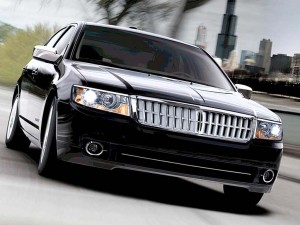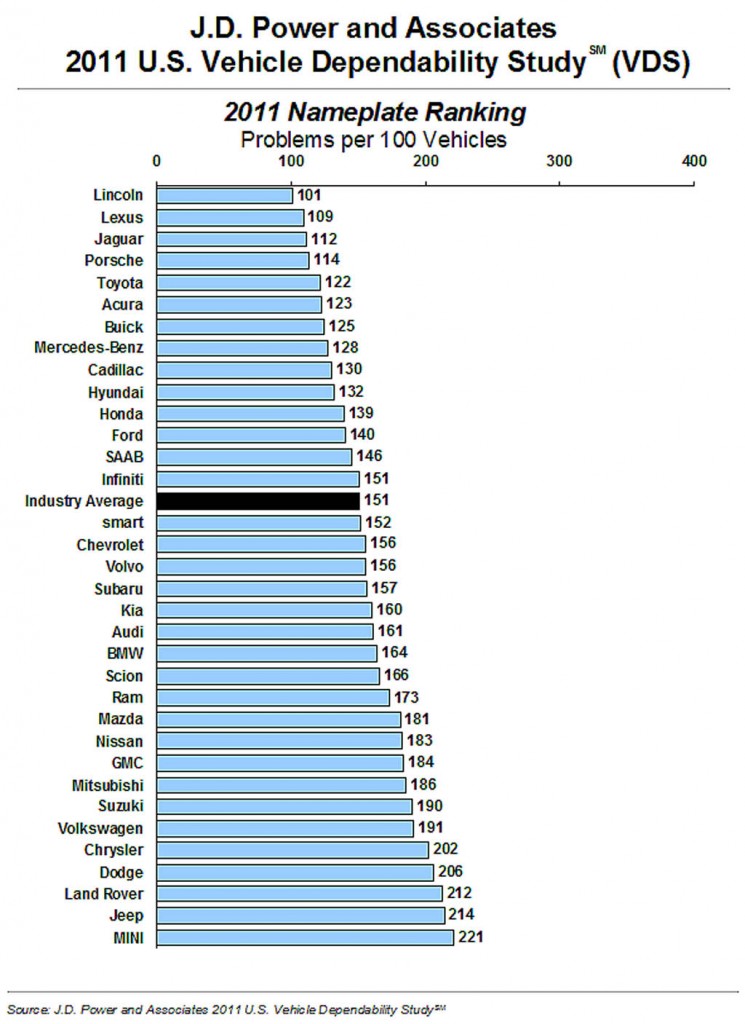Lincoln, the Ford Motor Co. luxury brand, has snatched the reliability crown away from long-time automotive reliability leader Lexus, underscoring Detroit’s significant improvements in the closely-watched J.D. Power Vehicle Dependability Survey.
While Japanese brands like Lexus, and its parent, Toyota, remain solidly dependable, according to the annual Power survey of owners of three-year-old cars, trucks and crossovers, European and American – as well as Korean — brands are making significant gains.
The good news is that vehicle dependability is improving across the board, according to Power. The average product included in the 2011 Vehicle Dependability Survey, or VDS, had an average of 151 problems per 100 vehicles, down from a score of 170 “PP100” just two years ago.
“Automakers, as a whole, have made significant improvements in reducing traditional problems, particularly with vehicle interiors; engines and transmissions; and steering and braking during the past several years,” said David Sargent, vice president of global vehicle research at J.D. Power and Associates.
“However, as manufacturers add new features and technologies to satisfy customer demand and new legislation, they face the potential for introducing new problems,” Sargent warned.
For the first time since the VDS was launched, in 1990, Lincoln grabbed the lead, with a score of 101 problems per 100 vehicles. Lexus came in second, with a score of 109 – with the lower the number translating into the fewer defects and other problems reported by owners.
Jaguar was third, with a score of 112 PP100, Porsche close behind at 114. Toyota rounded out the Top 5, the highest-ranked mainstream brand, with a score of 122 PP100.
The Japanese giant and its various brands – including Lexus and Scion – also led in seven individual product segments, more than any other manufacturer. These included the Lexus RX luxury crossover, the compact Scion xB, and the Toyota 4Runner SUV.
Ford received three segment wins with models including the Fusion and Lincoln MKZ, while General Motors and Honda tied with three segment wins each. BMW, Mercedes-Benz and Mazda each led in a single product segment.
The average 2008 model, according to Power’s latest dependability survey, experienced 151 problems per 100 vehicles after three years on the road. The list of brands scoring better than average included several normally not associated with strong quality and reliability, at least according to conventional wisdom, including Jaguar, Hyundai and Saab.
Four Detroit brands scored better than average; Lincoln, Buick, Cadillac and Ford. So did four Europeans: Jaguar, Porsche, Mercedes-Benz and Saab. Korea’s Hyundai made the cut, as did five Japanese marques: Lexus, Toyota, Acura, Honda and Infiniti.
While Detroit makers showed marked improvements, there was a wide gap between the best and worst of the Big Three. Jeep landed second-to-last in the 2011 VDS – just ahead of Mini – with an average 214 PP100, or more than twice as many problems as the average Lincoln vehicle.
On the whole, imports averaged about 18 fewer problems per 100 than domestic models, largely due to the poor performance of Chrysler’s various brands.
But a number of Europeans fared poorly, as well, Mini averaging 221 PP100, Land Rover only slightly better at 212.
The worst-ranking Japanese brands were Suzuki, at 190 and Mitsubishi coming in one spot better with a score of 186 PP100.
One of the ancillary findings from the 2011 VDS is that the more problems an owner experiences with a vehicle the less likely they are to go back to an authorized dealer for service. Among those who have had no problems to report, 76% say they’ll go to the dealer when service is required. Among those who experienced six or more problems, only 42% will turn to the dealer for paid – non-warranty — repairs.


